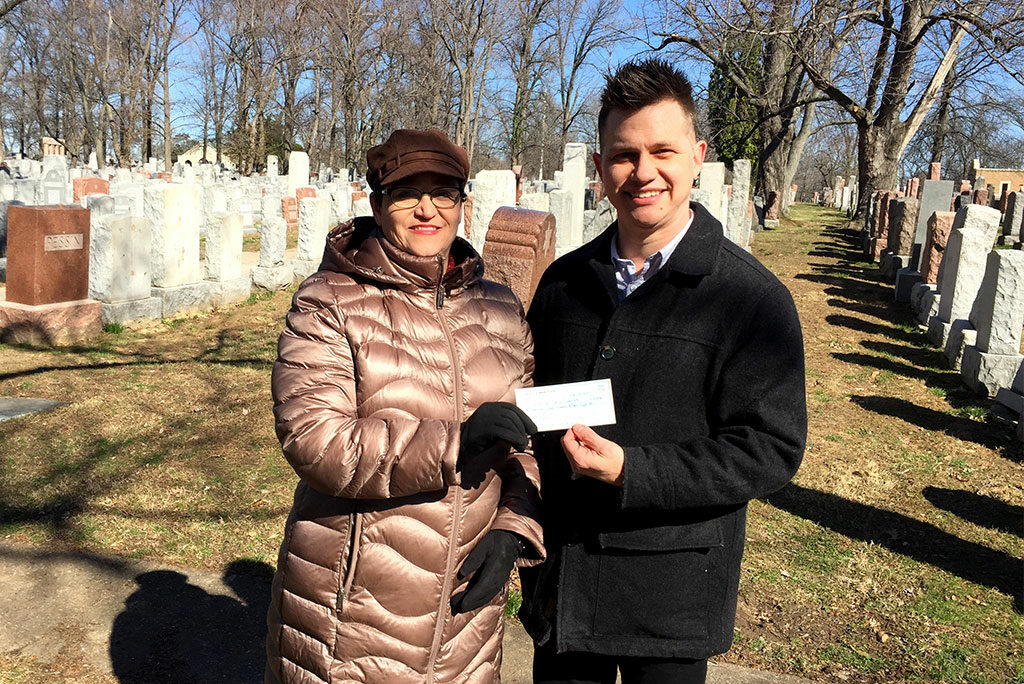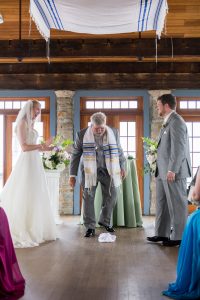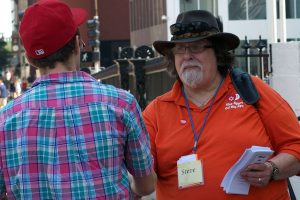
By Paula Schlueter Ross (paula.ross@lcms.org)
When the Rev. Chris Paavola, pastor of All Nations Church in University City, Mo., handed a check for $3,348 to Anita Feigenbaum to help with repairs and increased security at a vandalized Jewish cemetery, “she was both elated and startled” and asked the pastor why Lutherans would do such a thing.
“We wanted to show chesed to our neighbors at Chesed,” Paavola responded, referring to the Hebrew word for “kindness” and the nearby Chesed Shel Emeth Cemetery.
Feigenbaum, director of the Chesed Shel Emeth Society, “erupted in a huge smile and said, ‘Chesed! Kindness! Yes, you did show us chesed!’ ” according to the pastor.
All Nations — an LCMS congregation — meets at an ice cream shop some 2 miles from the cemetery. Paavola, who lives just 2 blocks from the cemetery, recalls seeing the police cars and news vans there on Feb. 20, the day after nearly 200 headstones were overturned and damaged.

With details “still unclear,” the congregation “decided we didn’t need a verdict to show mercy to our neighbors in need,” he said, so a fund was promptly set up on the church’s website, with All Nations members contributing the first $500.
News about the fund also was shared via the church’s Facebook and Twitter accounts, and when reporters discovered, retweeted and covered the effort, more than 5,000 people visited the website within hours, Paavola said.
“Nearly 100 people across the country, from multiple faiths, visited our website to give,” he said. Among those who shared information about the fund, he noted, was a Muslim woman who tweeted: “A local church is reportedly seeking donations to undo the damage caused by Jewish cemetery vandals.”
“While some people in our community may not agree with what our church believes, they cannot argue with what we do,” the pastor said. “For All Nations, this effort was a perfect opportunity for us to live out our value of being ‘a church as diverse as the city we serve.’ “
But “more than an opportunity to serve,” he added, “we saw this as an opportunity to demonstrate our heart. To let our ‘light shine before others, so that they may see your good works and give glory to your Father who is in heaven’ ” (Matthew 5:16).
‘Be the beacon of hope’
The Rev. Kevin Parviz, pastor of Congregation Chai V’Shalom (Hebrew for “Life and Peace”), an LCMS congregation in St. Louis with ethnic Jewish members, and executive director of Burning Bush Ministries, considers the Jewish-cemetery vandalism in St. Louis and in Philadelphia a few days later, “absolutely” hate crimes.
His own church has been vandalized twice — most recently about two years ago, when a swastika was painted on the front of the building, bringing to mind the horrors of the Holocaust.

Desecrating a cemetery is especially hurtful to Jewish people, Parviz said, because “all they have is the memory of their loved ones. There’s no afterlife, there’s no hope of reunion, no resurrection.”
Those who visit graves at a Jewish cemetery sometimes place small stones on top of the headstones, a tradition that tells the community that “someone is coming and visiting and remembering” — a sort of “guestbook,” he explained.
Parviz, an LCMS pastor, grew up in a Jewish home and came to faith in his early 30s before entering the seminary, so he is well-acquainted with Jewish beliefs as well as their fears.
Synagogues today typically hire armed guards for their worship services “because there have always been death threats,” he said. “It’s sort of the way we live,” as Jewish people.
As Christians, “we need to become sensitive to their reality — that they are not only perceiving persecution, but are being persecuted,” he said. “And just love them and really be the beacon of hope in our love for them.”
When Jewish people ask the pastor, “Why does the world hate us so much?,” he points out that “Satan was defeated at the Resurrection by a Jew named Jesus. And he has, ever since, taken out his wrath on the Jewish people.”
That idea can spark a conversation about Christianity, he said, paving the way for sharing with them “the hope that you have.”
Ideal faith-sharing scenarios might involve “one-on-one conversations, over coffee, with a dear [Jewish] friend.” It’s “risky,” he adds, and may lead to broken friendships, but “if you really have a friendship with someone, they want to know who you are as much as you want to know who they are.” And you might even ask if you can accompany them to synagogue, and invite them to your church.
“We just have to trust the Holy Spirit to do the work,” Parviz says, noting that some Christians “are afraid they don’t know enough or they’re going to make a mistake.
“We’re not the one that brings people to faith,” he adds. “It’s God. And we can’t make a mistake if we witness in love and authenticity.”
‘Let us love lavishly’
Steve Cohen, founder and director of The Apple of His Eye Mission Society, an LCMS Recognized Service Organization, says incidents such as the attacks on Jewish cemeteries “have to be taken seriously” as “they add to the stress of life in the Jewish community.”

Cohen, an LCMS Lutheran who was born and raised Jewish, said he believes that the “pendulum of anti-Semitism is swinging back toward aggressive, intentional persecution,” and agrees that because it is “satanically based” it’s not going away.
It’s “important,” he says, for Christians to show care and concern to their Jewish neighbors “because during the Holocaust we were silent,” which can be understood as “agreement.”
“Jesus tells us to lay down our life for others, not stand by and idly watch while bad things happen.”
Christians, Cohen says, “must stand for justice and truth” in the face of “tragedy, loss and attacks — verbal or physical,” and “not squander the opportunity to be invested and involved in our communities, even with those who do not yet share our faith in Y’shua, the Messiah.”
Encouraging his fellow Lutherans to “live our faith in love right where God has placed us, and let us love lavishly,” Cohen offers these suggestions for how they might respond to anti-Semitism:
- “First, and most obviously, pray for those affected that they would find peace, safety and justice.
- “Second, reach out to those in your community. Send a letter from your church letting them know you are standing with them and offering to help.
- “Hold a prayer gathering for your community to bring believers together to stand against the frightfulness of these challenging times.
- “Write a letter to the editor of your [newspaper] expressing condemnation of vandalism and cowardly acts, and indicating that you are praying for your fellow members of your community.
- “Visit your local synagogue [during] a Sabbath service … to show your care for those who are in your community, and invite them to visit your congregation.
- “Ask the local rabbi if you could bring your confirmation class to a service to grow in their understanding of their Jewish neighbors.
- “In [the] context of showing love for others, remember that the greatest act of love was given through the Messiah’s death and resurrection — let them know of God’s love for them through Jesus.”
Cohen, who calls the recent surge in anti-Semitic activity in the U.S. “alarming” and “horrible,” urges LCMS congregations to “take action now” by sharing shalom (peace, harmony) with their Jewish neighbors through prayers, words and actions.
“One never knows the impact of good done in the face of horrors unspeakable,” which “could lead to opportunities for meaningful evangelistic dialogue,” he says.
“Let us take into our hearts Paul’s passionate plea from Romans 10:1 — ‘Brothers, my heart’s desire and prayer to God for Israel is that they might be saved.’ ”
For more ideas on reaching out to Jewish people, visit The Apple of His Eye website.
Posted April 5, 2017



